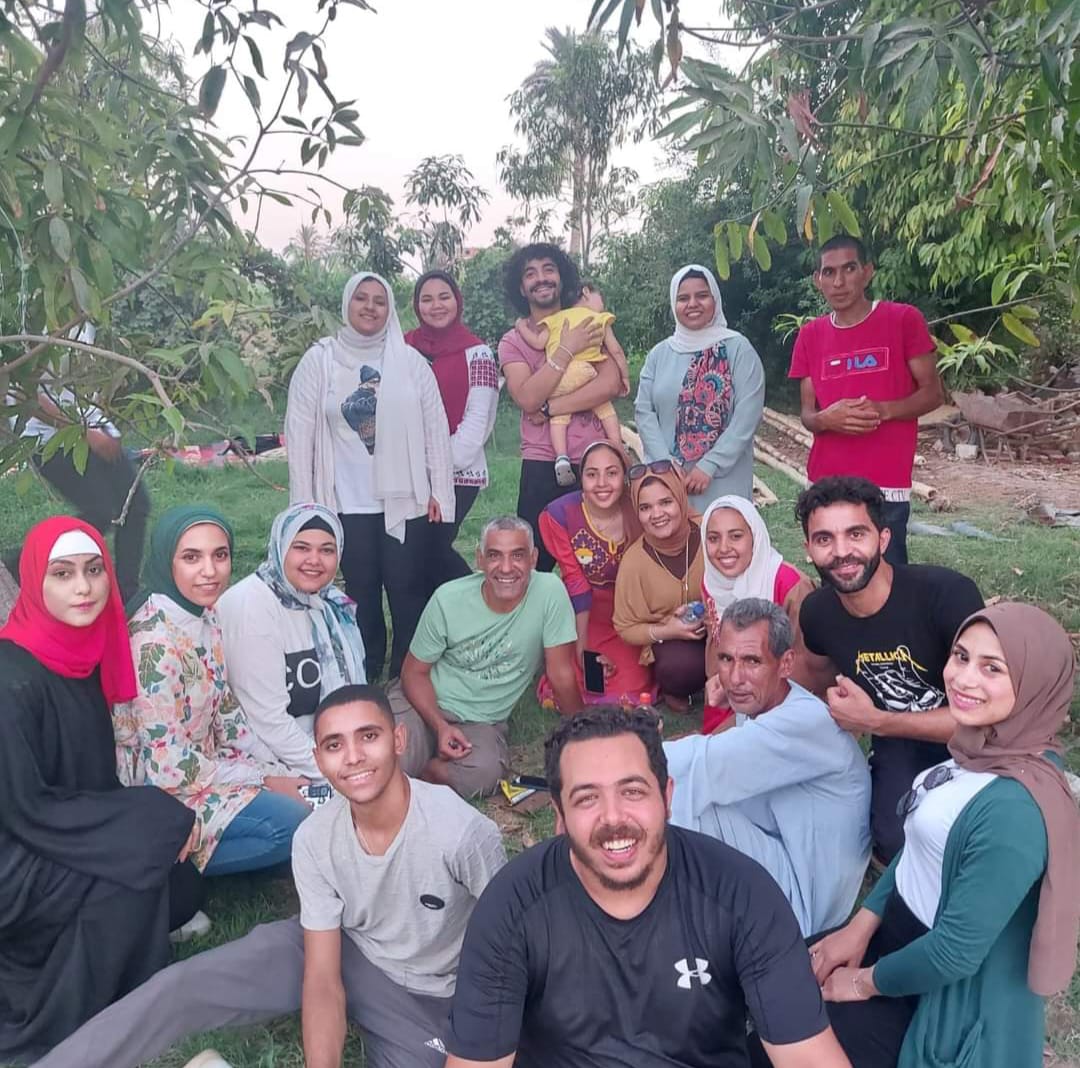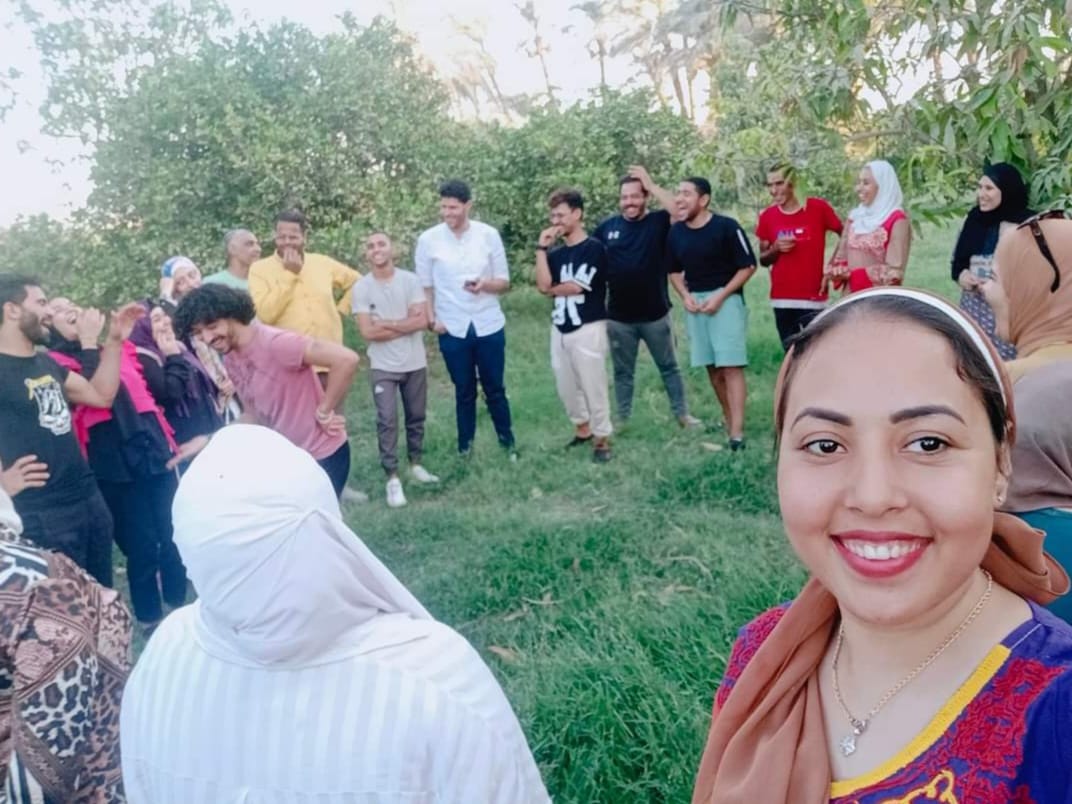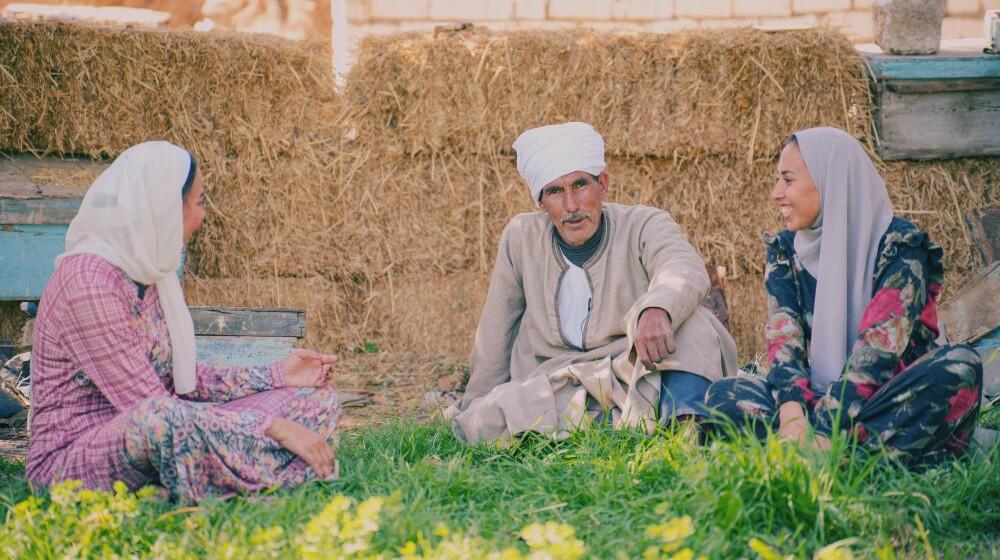Twin sisters Maha and May Abdel Tawab had been rehearsing a theatre performance along with the rest of the Nawah theatre group, when they suggested a change of scenery for their last day.
The sisters invited the entire group to come rehearse at the family farm in a village in Fayoum, but the group was reluctant to come.
“They asked me if my father will be comfortable with us bringing a group that includes young men into the village, let alone our home,” Maha said, “But I told them that it will not be a problem.”

Not only was Maha and May’s father very welcoming of the group, he was so inspired that he ended up writing a song for them to include in the performance.
The sisters and their father Abdel Tawab Abdel Ghany describe their village in Fayoum as very conservative, where community members can frown upon women and girls performing on stage.
But Abdel Ghany says he supported his daughters when they first joined the Nawah Theatre Team.
The Nawah Community Art Team is a network of young people established with the support of UNFPA with the aim of empowering a group of young people to raise awareness on various developmental issues through theatre. Nawah was formed in 2017 in cooperation with the Ministry of Youth and Sports and Etijah.
The theatre performances are the product of workshops conducted with the Zad Art Team, who coach volunteers on developing theatrical scripts and songs to raise the awareness of their communities on issues including female genital mutilation (FGM), family planning and gender-based violence.
This year, with Egypt hosting COP27, the young volunteers were oriented on climate change issues and focused on the topic in their scripts.
It was only fitting that the Fayoum group conclude their rehearsals surrounded by agricultural land, where the impact of climate change has started to materialize.
“I am first and foremost a farmer,” Abdel Ghany says, “and I am witnessing the impact of climate change first hand.”
After everyone left, Abdel Ghany wrote a post on Facebook thanking Nawah and expressing how proud he was that his farm hosted such a cultural activity. He ended his post with a few verses of a poem.
When Mohamed Ali Hozayen, Director of the Zad Art Team, saw the Facebook post, he asked Abdel Ghany to complete the poem and had another Nawah volunteer from Beni Suef compose its music.
The song, Put on a Colorful Garment, is now integrated in the performance.
Although this was the first time Abdel Ghany interacted with the team directly, he has always been an avid follower of the Nawah performances.
The sisters say he has never missed a performance since they joined Nawah in 2018.
Abdel Ghany faces criticism by some of his family and community members in the village, where he says many harmful practices against women and girls unfortunately still persist.
“Some parents still force their daughters out of school and marry them off early,” he says, “I was always told I didn’t need to invest in my girls’ education but I resisted.”
Maha and May explain that their father has always encouraged them to be independent.
“My father has supported us since the beginning,” May says, “although some people are against what we are doing, including family members, my father has always stood up for us.”
“He always told us to find ourselves, and go out and see the world,” Maha adds.
Through the Nawah team, both sisters were oriented with reproductive health topics. The theatre team is part of UNFPA’s Population Awareness Clubs, run in partnership with the Ministry of Youth and Sports and Etijah.
Population Awareness Clubs operate in different Youth Centers around the country, hosting awareness activities around population issues for young people using innovative tools, including music and interactive theatre. The activities aim to raise awareness around gender-based violence, family planning, and harmful practices.
There are currently over 400 Population Awareness Clubs supported by the European Union in Egypt, Royal Norwegian Embassy in Cairo, Embassy of Canada to Egypt, the Italian Agency for Development Cooperation, KOICA Egypt and the UNFPA-UNICEF Joint Program on the Elimination of FGM.
Maha joined Training of Trainers (ToT) workshops as part of the Population Awareness Clubs, and is now a reproductive health trainer herself.
She explains that sessions on FGM are the ones she feels most strongly about, having been subjected to it herself.
Maha and May are two of five girls in the family, four of whom were cut.
“We stood up for our youngest sister and explained to our parents the harms of FGM,” Maha says.
At the onset of COVID-19 and the lockdown it imposed, Maha attended the workshops virtually.
“I always made sure I sat next to my mother during sessions on FGM so she could hear,” she says, “eventually she started getting inquisitive and asking me about why it is wrong and harmful.”
When it was time to subject their youngest sister Zeinab to FGM, their mom objected.
“She then gathered me and my sisters and apologized for subjecting us to this experience, and vowed to not repeat the same mistake with Zeinab,” Maha says.
For May, being part of the theatre team has also impacted her personally.
“I was an introvert and I was shy,” she says, “now I am able to express myself better and fight for my rights.”
Abdel Ghany himself helps confront harmful practices in his community and raises awareness around the impact of gender-based violence and early marriage.
“I always tell people that if they educate girls, it will pay off and they will ultimately help fight wrong traditions in their communities,” he says.


